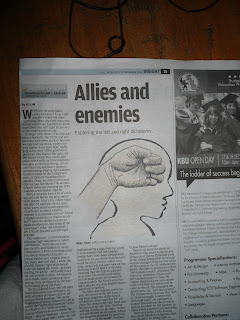As it appeared in Star 2, Mind Our English, Wednesday 30 November 2011
When my recently politically-conscious 17-year-old daughter asked me what right wing was, my right brain was tickled into action: I wanted to know more about this left-right dichotomy in this small world of ours.
To begin with, those of us who had been schooled in the 1970s and earlier must have been dullards because we only had one brain. I guess our grey matter must have been really grey as the post-1990s generation possess two brains: the right and left brains which they use to optimim effect with such learning technologies as lateral thinking, accelerated-learning and Neuro-linguistic Programming, playing light ambient baroque music in the background even as they are swotting up their algebra. Dang, we didn’t even know that we had two brains! No wonder, schools today are churning out SPM students with double-digit As like Beryl chocolates.
Well, I certainly have a lot of catching up to do before my grey matter turns greyer. I did a free online brain test with 54 multiple-choice questions. I had to respond to statements such as ‘I need complete quietness to read or study’ and ‘I have the ability to listen to music or television and study at the same time’. What did I find out? I am 57% left-brained and 43% right-brained (http://www.wherecreativitygoestoschool.com).
This makes me ‘a critical thinker who uses logic and sense to collect information’. And I rely on numbers, words, and symbols to retain information. It kind of confirms what I’ve always thought of myself- a critical thinker and a logical person. Yet, every now and then, I know the playful, creative right brain would tease my logical left brain- at times leading me astray- with wild, fanciful, and grandiose ideas. Fortunately, most times, when tantalizing ideas pop up, they are filtered by the logical thinking of my left brain.
On the political front, the left-right brain dichotomy has nothing to do with whether you have right or left wing political leanings. The terms originated in France where the Left is called the ‘party of movement’ while the Right is the ‘party of order’. Taking Malaysia as an example, the Right- Barisan Nasional- favours the established social order while the Left-Pakatan Rakyat Malaysia- favours equality and social change. This is not to say that right-wing parties do not favour equality.
Although the terms are convenient descriptions of polar opposites, politicians on both sides may take a right-wing stance or a left-wing stance depending on the issues involved. The far right would include fascists and extreme conservatives and nationalists, while the far left would include communists. In Europe, German political scientist Professor Klaus von Beyme, who categorized European political parties into nine families, was able to arrange seven of them from left to right: communist, socialist, green, liberal, Christian democratic, conservative and right-wing extremist ( http://en.wikipedia.org/wiki/Left%E2%80%93right_politics).
The Bible also contains unfavourable references to the left hand. In the Final Judgment of the Gospel of Matthew, Jesus says that “He will place the sheep at his right hand and the goats at his left. Then the King will say to those on his right, ’Come you are blessed by my Father, inherit the Kingdom prepared for you from the creation of the world’”. To those on the left, the King will say, ’Away with you, you cursed ones, into the eternal fire prepared for the devil and his demons’. Those on the left ‘will go into eternal punishment, but the righteous will go into eternal life’. Yes, even being good is spelt righteous.
Until a few decades ago, a Chinese or Japanese child holding chopsticks with their left hand would be met with a reprimand or a rap on the knuckles. In Victorian times, school teachers would punish children who use their left hands to write. The English term cack-handed is slang for left-handed, which also means clumsy. It is said to have been derived from the Latin cacare, which refers to the performing of ablutions with the left hand. Similarly, in India, Africa and Malaysia the left hand is deemed unclean, and using your left hand to touch another, or give and receive something is definitely taboo. An African proverb says, ‘You do not use the left hand to point the way to your father's village’.
There is an anecdote about an American who asked a Chinese gentleman at a Chinese Christmas party in the United States what he thought was the strangest thing he saw when he first came to the US. Without hesitation, the Chinese gentleman replied, ‘left-handed people’. Perplexed, the American wondered if there were left-handed people in China. He replied that he had not seen anyone write with their left hands until he came to the U.S. This prompted the American to say, “Isn’t that genetic?” The Chinese went on to say that ‘kids in China are taught to write with their right hand’. He continued to explain that unlike in the U.S where devices are made for left-handers, in China it was a question of practicality.










